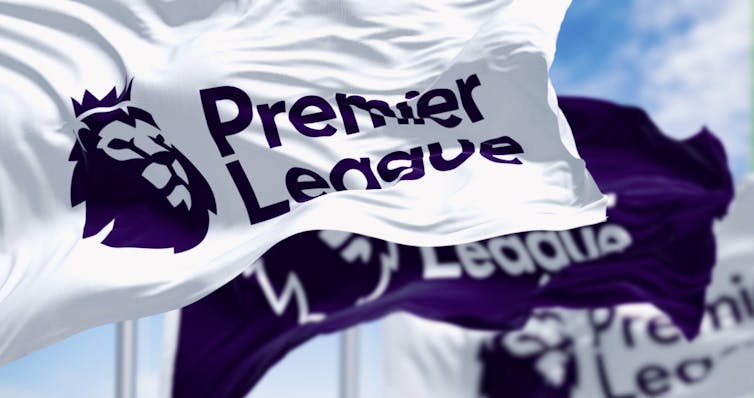The Premier League is tweaking the rules to keep things competitive – and VAR is staying too
- Written by Christina Philippou, Principal Lecturer, Accounting, Economics and Finance, University of Portsmouth

Another Premier League season of sweat, celebration and despair came to an end on May 19 with Manchester City crowned champions once again[1]. Then, after ten months battling against each other, the 20 teams of English football’s top flight came together on June 6 to discuss their plans for the future.
One of the most anticipated items on the agenda at the private annual general meeting in Harrogate, Yorkshire, was a vote on whether to get rid of the VAR (video assistant referee) system which has proved so controversial since it was introduced in 2019[2].
Wolverhampton Wanderers had called for it to go but found no supporters, so VAR is here to stay[3] – and some would say with good reason. Introduced to reduce the number of refereeing errors, research sugggests[4] that in this regard, VAR has been a success.
But decisions are still disputed (hence the one vote to scrap it) and sometimes take a long time[5], which some say is taking spontaneity and excitement out of the game.
This could be risky. Even something as popular as Premier League football has to compete against other sports for viewers[6], and factors which viewers find frustrating will not help its cause.
But there are commercial upsides to the use of VAR. For example, some broadcasters can use these breaks to air adverts. And while sponsors generally like to avoid controversy[7], issues around VAR tend to keep affected clubs in the media spotlight, creating continued exposure after matchday.
Other commercial subjects up for discussion at the AGM were new financial regulations and salary caps. While profitability and sustainability rules have not changed, some new approaches will be trialled next season[8].
One of these will is the introduction of a voluntary “squad cost rule”, which limits the proportion of a club’s income that it can spend on player wages to 85%.
But as the average percentage[9] for Premier League teams has been at (or below) the 70% mark for over a decade, this change is unlikely to have much of an impact on club finances.
Teams that play in European competitions such as the Champions League already have to abide by governing body Uefa’s financial sustainability regulations[10], commonly known as FFP (financial fair play). For these clubs, the limit will reduce from 90% last season to 80% next season and 70% the season after that.
Another voluntary addition to the Premier League’s financial regulations which will be trialled next season is the “top-to-bottom anchoring rule”. This is effectively a hard salary limit, which means every club’s wage bill is set at five times the amount[11] of the lowest club’s media and sponsorship income.
Again, this is not going to have a major affect. Only one club, Chelsea, would have been in breach of this rule last season.
But the aim is make sure the Premier League remains competitive[12], by limiting how much the wealthiest teams can spend on expensive players. That “competitive balance” is widely seen as a key element of the league’s continued popularity – despite concerns about “yo-yo clubs”[13] (which get promoted and relegated on a regular basis) and the number of teams that can seriously contend for the title (Manchester City have now won four in a row, and six of the last seven Premier League titles).
More competitive balance generally means more excitement and more engagement from viewers. More viewers makes broadcasting rights more valuable, which means more money for the Premier League. So you can see why there are moves designed to keep things interesting.
There are objections[14] to a hard salary cap, however, with some claiming that big European clubs such as Real Madrid would have more money to spend on players and therefore be more dominant. But the argument is not a strong one. The Premier League earns twice as much as the next highest-earning football leagues[15] (Germany’s Bundesliga and Spain’s La Liga), which have financial regulations of their own.
Now that the AGM has taken place, the Premier League has a short summer break before the start of next season. And off the pitch, it looks like it could be a busy one.
Manchester City have launched legal action[17] against the Premier League over its rules on “associated party transactions” (money received from organisations with prior links to the club or linked to club owners). There is also the case due to be heard at the end of the year brought by the Premier League against Manchester City for alleged breach of financial regulations[18], whose outcome may result in points deductions and see a change of expected title winners next season.
Meanwhile, promoted Leicester City may start the new season with a points deduction[19], following alleged breaches of Premier League financial regulations in the 2021-22 season. But they’ll still be glad to have made a return to the most lucrative football league in the world.
References
- ^ champions once again (www.bbc.co.uk)
- ^ introduced in 2019 (www.premierleague.com)
- ^ VAR is here to stay (www.premierleague.com)
- ^ research sugggests (link.springer.com)
- ^ take a long time (www.tandfonline.com)
- ^ for viewers (www.sportcal.com)
- ^ avoid controversy (www.worldscientific.com)
- ^ trialled next season (www.premierleague.com)
- ^ average percentage (assets.publishing.service.gov.uk)
- ^ financial sustainability regulations (www.uefa.com)
- ^ five times the amount (www.nytimes.com)
- ^ remains competitive (www.emerald.com)
- ^ “yo-yo clubs” (www.tandfonline.com)
- ^ objections (shura.shu.ac.uk)
- ^ next highest-earning football leagues (www.statista.com)
- ^ rarrarorro/Shutterstock (www.shutterstock.com)
- ^ Manchester City have launched legal action (www.bbc.co.uk)
- ^ alleged breach of financial regulations (www.bbc.co.uk)
- ^ with a points deduction (www.espn.co.uk)







